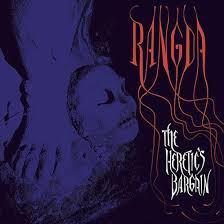Since the 2007 dissolution of their long-running, free-wheeling trio Sun City Girls (following the death of drummer Charles Gocher), brothers Alan and Sir Richard Bishop have kept busy, churning out all manner of solo and collaborative records and touring the globe, continuing to absorb its endless supply of folk musics along the way. In recent months both have returned, though, in effect, to the classic Sun City Girls format – two guitarists and a drummer – to release albums with the disregard for genre, time, and other constraints that defined their beloved earlier group.
Alan’s effort, part of Three Lobed’s Parallelograms box set, is an abrasive-but-playful set by an impromptu power trio: Bishop, with guitarist Bill Orcutt and drummer Chris Corsano. Sir Richard’s outfit, Rangda, features Ben Chasny on guitar and, well, Corsano on drums again. (A recent Wire feature suggests that if anyone could ever stand in for Gocher, it’d be Corsano.) This latter threesome is more established, now with three LPs dating back to 2010; their latest, The Heretic’s Bargain, especially compared to its gloriously haphazard Parallelograms counterpart, speaks to the group’s experience. Indeed, Rangda have developed a clarity and synergy that make The Heretic’s Bargain tight, thrilling, even (somewhat) accessible.
From the outset, Rangda’s members display their mesmerising technical abilities, jamming in newly slick tandem. Sir Richard leads the charge, kicking off first track ‘To Melt the Moon’ with his characteristic loose, modal, post-Dick Dale lead. He gives us lightning plucking atop a furious drumroll, which morphs into a slinky vintage-sounding lick bolstered by Corsano’s pulsing, 5-beat phrases. In its first half, ‘To Melt The Moon’ takes shape as a semi-straightforward surf tune. Somewhere in the middle of the song, though, both Bishop and Chasny become restless and, riffing dextrously off one another, obscure the song’s rhythmic backbone with constantly-shifting fretboard patterns. Corsano continues to push ahead powerfully, but the lucid echoes of The Del Tones grow dimmer as the song progresses through its dizzying denouement.
The next two tracks, ‘Sin Eaters’ and ‘Spiro Agnew’, play out in a similar fashion – as energised riff rock gone slightly askew. Whereas Bishop-Orcutt-Corsano, foregrounding Orcutt’s signature attack, deconstruct the rock of ages past almost beyond recognition (see: their “cover” of Cream’s ‘Politician’), Rangda have always kept the form and momentum of older rock music stylings in tow. On False Flag and Formerly Extinct, this phenomenon took the form of entropic Americana sprawl; on the first half of The Heretic’s Bargain, then, they offer a comparatively polished vision of dry rock & roll, drawing lines from surf to L.A. punk to Touareg blues. The move towards crisp efficiency invigorates the group and brightens its vision – even if some of us may miss the Crazy Horse appeal of False Flag.
Of course, Rangda ultimately let loose on the album’s final two pieces. ‘Hard Times Befall The Door-to-Door Glass Shard Salesman’ and ‘Mondays Are Free At The Hermetic Museum’ comprise a 27-minute start-stop exploration that, in contrast to the linear precision of the first three tracks, find Bishop pulling back a bit and letting chance take hold. Long stretches of inanimate feedback are cut with slack riffing by Chasny or Bishop (or both, duelling). Often spurred by nimble Corsano interjections, these energised guitar vignettes start to coalesce as oases along a wandering, sun-stroked path. The album’s triumphant finale, which arises from an extended meditative passage in the final two minutes of ‘Mondays are Free’, is especially poignant – and refreshing.
For all the heroics on display here, though, it sometimes sounds as though these three hyper-prolific virtuosos are – believe it or not – resting in something of a comfort zone. They’ve increased their compositional and improvisational fortitude as a unit, but they’re still wandering the same general aural territory as Rangda (or Sun City Girls or Chasny’s Comets On Fire). Listening to The Heretic’s Bargain, one wonders what mind-altering dimensions a trio this skilled may be able to reach in the future. Which is simply to say, in addition to being an admirable effort in itself, The Heretic’s Bargain implies an auspicious future for Rangda.


